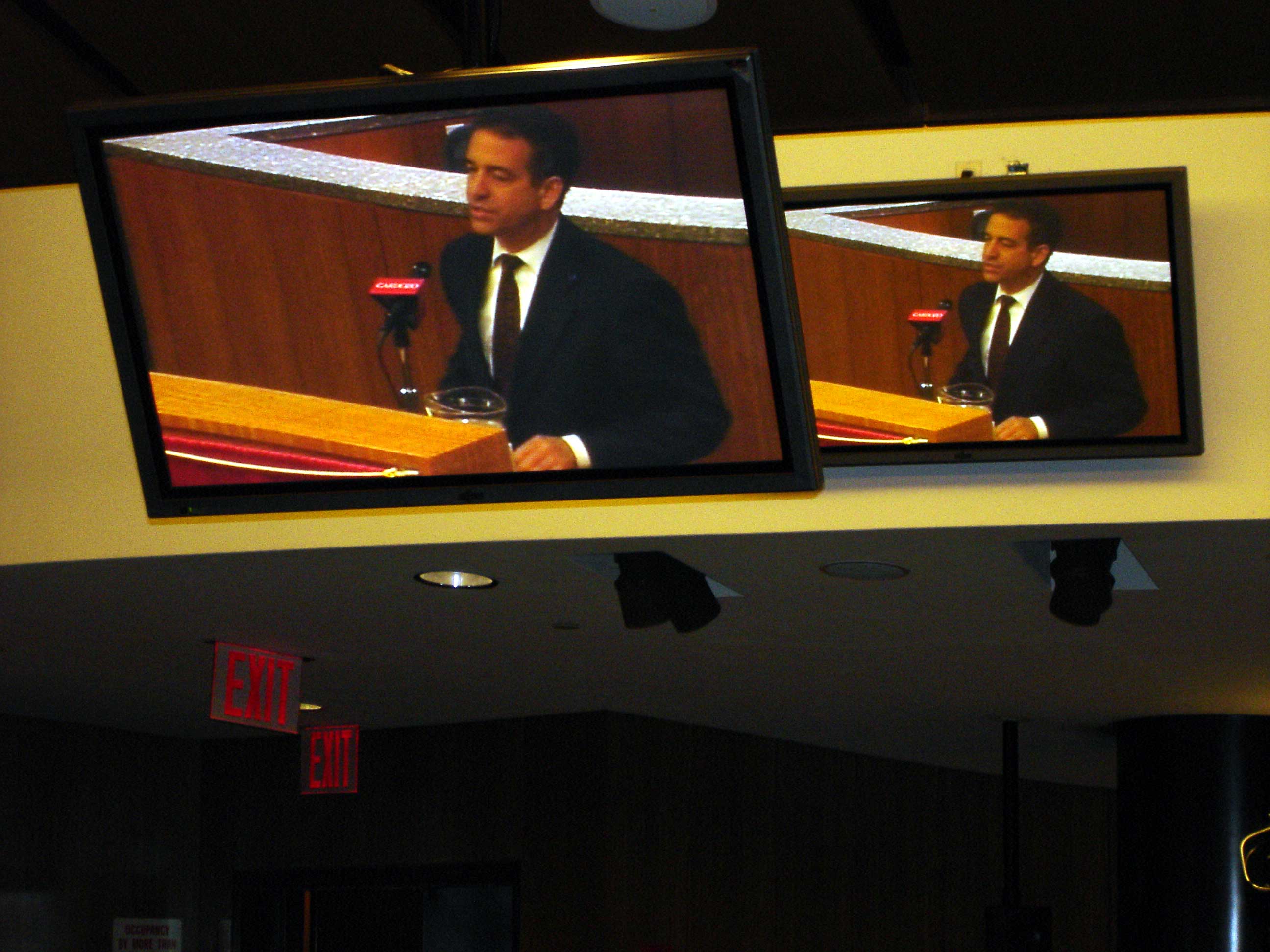
With a tip-off from the Progressive Patriots Fund, I had the opportunity yesterday to catch Sen. Russ Feingold speak on the Patriot Act and the NSA wiretapping scandal over at Cardozo Law School. (Their pics are a lot better than mine — I forgot to charge my batteries, and thus only got in 2 or 3 shots before my camera died on me.) And how was he? Well, all-in-all, he came off as a convincing candidate for the election ahead, as well as an impressive, informed, and personable fellow. To be honest, I found his remarks a bit lawyerly (then again, he’s a lawyer speaking before a law school, so that’s not really a fair criticism), but, taken in full, he seemed a committeed progressive and a refreshingly candid leader, the type of dynamic, independent thinker the Senate should be teeming with, if the system came anywhere close to working these days.
The gist of Sen. Feingold’s remarks was thus: Al Qaeda is the central threat facing America and has been since 9/11. Yet, instead of bringing the nation together to eliminate this terrorist organization, the Dubya White House has chosen time and time again to endanger our national security and compromise our most fundamental American values for their own ideological or power-hoarding purposes. (Iraq, Guantanamo, extraordinary rendition, secret gulags, you name it.) Along those lines and as we now all know, the Patriot Act, which only Feingold voted against in 2001, contains some terrible provisions therein, the most notorious example affecting Middle America being Section 215 (which gives law enforcement, among other things, the right to see what you’ve been reading.)

Yet, as per the norm, Dubya has refused to admit that it’s even possible that something might be wrong with the Patriot Act now that it’s up for renewal — only that it’s necessary to defeat the evildoers and that any microscopic change in the statute could rend the fabric of freedom irreparably. (Despite this now-somewhat hoary ploy, Feingold and others have succeeded in blocking a permanent blanket extension for now, as y’all know if you’ve been visiting here lately.) And, of course, Dubya has taken this same tack of obfuscation and fear-mongering to cover up his brazen wiretapping power-grab — which, according to Congress’s own research arm, broke at least two laws and counting.
Again, this story is not news to many Dems out there, but Feingold laid it out in clear, comprehensible, and systematic fashion. (The only “breaking news” made was the Senator announcing this letter to Gonzales, asking him why he, in effect, lied to the Judiciary Committee during his confirmation hearings about the NSA wiretaps.) And he had some good lines throughout — In reply to Rove’s ridiculous claim that Dems were “pre-9/11”, Feingold quipped that the GOP suffered from a “pre-1776” mentality these days. (He also retold the recent Patrick Henry exchange.) To be honest, I’d liked to have heard more in this vein — In terms of breaking down the legislative legerdemain and legal issues at hand, Feingold was superb. But I thought the speech needed more narrative sweep and rhetorical grandeur, more explanation of why this battle matters so much to the workings of the republic. He doesn’t have to turn into Robert Byrd overnight. Still, I thought the remarks could have benefited from more dramatic heft and historical resonance: Jefferson, Madison, Adams, Lincoln, Wilson…they’re all relevant here. (Then again, as I said above, I was an historian sitting in a room full of lawyers, so I was a tougher sell than most.)

Along those lines, if there was a problem with this presentation, it’s that the Senator, while clearly outraged, at times seemed much less livid about all this than many in the audience, who occasionally sounded ready to hoist the black flag. (In fact, many will no doubt be happy to hear that Feingold was asked twice “why Democrats are so lame.” As he noted (and as the blogosphere can attest this week), if a crowd in New York City is this irate with the party, the Dems might be in serious trouble nationwide in November. Still, he also emphasized that the Democrats could be more effective fighters if they actually controlled a house of Congress — You can’t hold hearings if you’re in the minority.
In terms of other questions, Feingold said he supports and will take part in the very late-developing (and now already defunct) Alito filbuster (Roll Call.) In fact, he thought the Dems made a crucial mistake in capitulating to the original “Gang of 14” compromise, arguing cogently that Dems have seen nothing for it and may well have had the votes to win Catkiller‘s game of nuclear chicken. Since Casino Jack and lobbying reform seemed too big a subject to address competently in the time allotted, I asked him a question about his thoughts on the NYT decision to spike the NSA story for a year, his general view of the mass media’s performance in serving as a check on these types of executive abuses, and (’cause it seemed apropos) his thoughts on the burgeoning blogosphere’s role in all this. He didn’t really go after the Times decision, and said that, in terms of the recent Patriot Act debate, he thought the press had actually done an ok job. Regarding blogs, he called the Internet “a miracle for populist politics,” which was a good enough soundbite that everyone in my row dutifully wrote it down at the same time.

And, of course, Sen. Feingold was asked — a couple of times — whether or not he was running for President in 2008. Naturally, he played it coy — After all, we still have just under two years before the Iowa caucus. But, for what it’s worth, I was impressed by him — He’s not a first-class emoter like Edwards or Clinton, of course. Instead, he comes across as a highly intelligent, capable, and nuanced thinker, a la Bradley, Kerry, or Gore on his better days. But unlike those three, he also seemed much more comfortable in his own skin, more naturally himself at the podium, and — most importantly — more content to play the maverick if his lefty principles dictate thus. (Although, as I said, I’d like to see him tone down the lawyer-ese and rev up more Wellstone-ish fire if he does make a White House run.) I suppose there’s a small, bordering-on-infinitesimal chance that Rodham Clinton, Biden, Warner, or someone else might drop all the “New Democrat” protective camouflage this time around and begin loudly and undefensively proclaiming progressive principles to the Heavens. But, until that unlikely event, my candidate in the 2008 Democratic primary is Senator Russ Feingold of Wisconsin. (Update: 1776 link via Medley.)




